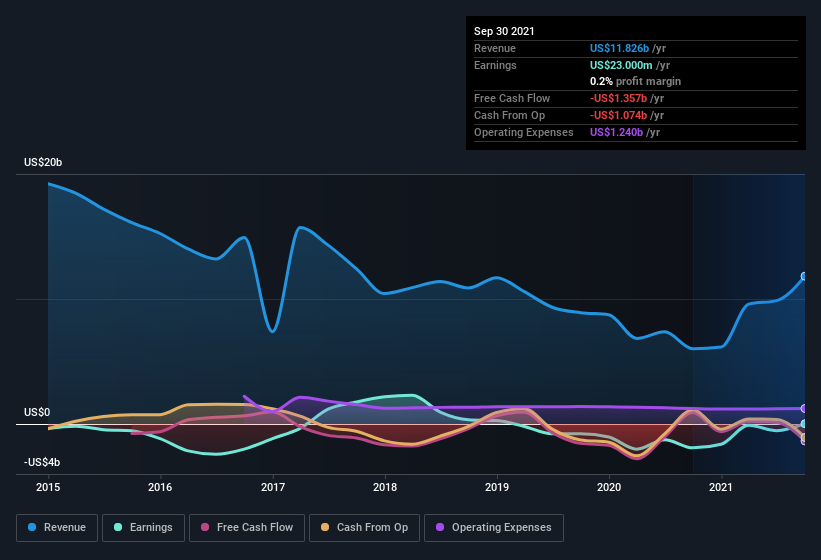- United States
- /
- Industrials
- /
- NasdaqGS:IEP
Shareholders In Icahn Enterprises (NASDAQ:IEP) Should Look Beyond Earnings For The Full Story
Despite posting strong earnings, Icahn Enterprises L.P.'s (NASDAQ:IEP) stock didn't move much over the last week. We decided to have a deeper look, and we believe that investors might be worried about several concerning factors that we found.
See our latest analysis for Icahn Enterprises

To understand the value of a company's earnings growth, it is imperative to consider any dilution of shareholders' interests. In fact, Icahn Enterprises increased the number of shares on issue by 20% over the last twelve months by issuing new shares. That means its earnings are split among a greater number of shares. Per share metrics like EPS help us understand how much actual shareholders are benefitting from the company's profits, while the net income level gives us a better view of the company's absolute size. Check out Icahn Enterprises' historical EPS growth by clicking on this link.
How Is Dilution Impacting Icahn Enterprises' Earnings Per Share? (EPS)
We don't have any data on the company's profits from three years ago. Zooming in to the last year, we still can't talk about growth rates coherently, since it made a loss last year. But mathematics aside, it is always good to see when a formerly unprofitable business come good (though we accept profit would have been higher if dilution had not been required). And so, you can see quite clearly that dilution is influencing shareholder earnings.
If Icahn Enterprises' EPS can grow over time then that drastically improves the chances of the share price moving in the same direction. But on the other hand, we'd be far less excited to learn profit (but not EPS) was improving. For the ordinary retail shareholder, EPS is a great measure to check your hypothetical "share" of the company's profit.
That might leave you wondering what analysts are forecasting in terms of future profitability. Luckily, you can click here to see an interactive graph depicting future profitability, based on their estimates.
Operating Revenue Or Not?
At most companies, some revenue streams, such as government grants, are accounted for as non-operating revenue, while the core business is said to produce operating revenue. Where possible, we prefer rely on operating revenue to get a better understanding of how the business is functioning. Importantly, the non-operating revenue often comes without associated ongoing costs, so it can boost profit by letting it fall straight to the bottom line, making the operating business seem better than it really is. Alongside the dilution mentioned above, we think shareholders should note that Icahn Enterprises had a significant increase in non-operating revenue over the last year. In fact, our data indicates that non-operating revenue increased from -US$1.29b to US$2.48b. If that non-operating revenue fails to manifest in the current year, then there's a real risk the bottom line profit result will be impacted negatively. Sometimes, you can get a better idea of the underlying earnings potential of a company by excluding unusual boosts to non-operating revenue.
Our Take On Icahn Enterprises' Profit Performance
In its last report Icahn Enterprises benefitted from a spike in non-operating revenue which may make its top line look unsustainably good, and even flow down to its profit. And the fact that it issued more shares means that its results look weaker from a per-share perspective. For the reasons mentioned above, we think that a perfunctory glance at Icahn Enterprises' statutory profits might make it look better than it really is on an underlying level. In light of this, if you'd like to do more analysis on the company, it's vital to be informed of the risks involved. Every company has risks, and we've spotted 3 warning signs for Icahn Enterprises (of which 1 is concerning!) you should know about.
Our examination of Icahn Enterprises has focussed on certain factors that can make its earnings look better than they are. And, on that basis, we are somewhat skeptical. But there is always more to discover if you are capable of focussing your mind on minutiae. For example, many people consider a high return on equity as an indication of favorable business economics, while others like to 'follow the money' and search out stocks that insiders are buying. So you may wish to see this free collection of companies boasting high return on equity, or this list of stocks that insiders are buying.
New: AI Stock Screener & Alerts
Our new AI Stock Screener scans the market every day to uncover opportunities.
• Dividend Powerhouses (3%+ Yield)
• Undervalued Small Caps with Insider Buying
• High growth Tech and AI Companies
Or build your own from over 50 metrics.
This article by Simply Wall St is general in nature. We provide commentary based on historical data and analyst forecasts only using an unbiased methodology and our articles are not intended to be financial advice. It does not constitute a recommendation to buy or sell any stock, and does not take account of your objectives, or your financial situation. We aim to bring you long-term focused analysis driven by fundamental data. Note that our analysis may not factor in the latest price-sensitive company announcements or qualitative material. Simply Wall St has no position in any stocks mentioned.
Have feedback on this article? Concerned about the content? Get in touch with us directly. Alternatively, email editorial-team (at) simplywallst.com.
About NasdaqGS:IEP
Icahn Enterprises
Through its subsidiaries engages in the investment, energy, automotive, food packaging, real estate, home fashion and pharma in the United States and internationally.
Fair value with mediocre balance sheet.
Market Insights
Community Narratives



